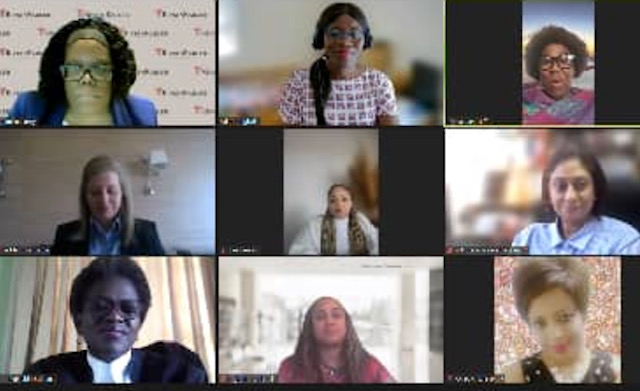Vance Center Examines Sexual Harrassment in South Africa’s Legal Profession
September 2022
The Vance Center the South African Women Lawyers Association (SAWLA), the International Federation of Female Lawyers, and the South African alumni of the Vance Center’s African Legal Fellows Program, in partnership with the US Embassy in South Africa, organized a two-part webinar series on eliminating sexual harassment in the workplace.
In South Africa, as in many countries across the globe, harassment and bullying, particularly sexual harassment, are prevalent in the legal profession. A 2019 study by the International Bar Association on bullying and sexual harassment in the legal profession found that almost half of South African female legal professionals have been sexually harassed, and 73% have been bullied.
In its project Advancing Women in Workplace, the Vance Center works with young women of color to support their advancement to leadership positions in the South African legal market. In addition to creating a program to help these junior legal practitioners with mentorship by senior colleagues and surveying gender diversity in the legal profession, it is investigating surrounding issues that limit women from attaining leadership positions.
To commemorate South Africa’s National Women’s Month, the Vance Center organized two webinars to highlight and examine the implementation of the South African Code of Good Practice on Preventing and Eliminating Harassment in the Workplace (the Code), which came into effect in March 2022 and was developed in line with ILO Convention No. 190, the first international treaty to recognize the right of everyone to a world of work free from violence and harassment, including gender-based violence and harassment.
The first webinar in the series discussed existing the Code and other regulations on sexual harassment in the workplace. Melissa Bruni, a representative of the US Embassy in South Africa, and Nomaswazi Shabangu, president of SAWLA, opened the discussion, emphasizing the importance of joint efforts to eliminate sexual harassment in the workplace.
Zanile Sibya, a commissioner at South Africa’s Commission for Conciliation, Mediation, and Arbitration, provided an overview of the Code, its innovations, and its differences from its 2005 predecessor (the Amended Code of Good Practice on the Handling of Sexual Harassment Cases in the Workplace). Janine Myburgh, chairperson of the South Africa’s Legal Practice Council, reviewed existing and anticipated changes by the Council in regulating legal practitioners.
Ann Ostrager, a partner at Sullivan and Cromwell, provided the US perspective on regulating sexual harassment in the workplace at the federal and state levels. Finally, Judge Benita Whitcher of the South Africa Labor Court analyzed different approaches to adjudicating sexual harassment cases and case laws.
The second webinar considered the practical implementation of policies on sexual harassment within the legal profession. Advocate Soraya Hassim SC reviewed challenges facing young female practitioners in dealing with and reporting sexual harassment. Hedda Schensema, director at Cliffe Dekker Hofmeyr, and Tracy Richelle High, partner at Sullivan and Cromwell, explained various measures by law firms in South Africa and the United States to address the prevention and management of sexual harassment from a policy and practical perspectives. Finally, Tamika Hardy, partner at Rivkin Radler, provided helpful advice for young female legal practitioners in reporting and accessing justice when harassed.
Adaobi Egboka, Vance Center Africa Program Director, moderated the well-attended series, with panelists calling for increased awareness of the Code among law firms and legal practitioners. In addition, they urged that organizations ensure mandatory annual sexual harassment prevention training for staff and new hires and implement strategies that encourage additional support to women, such as bystander and ombudsman roles in the organization.

